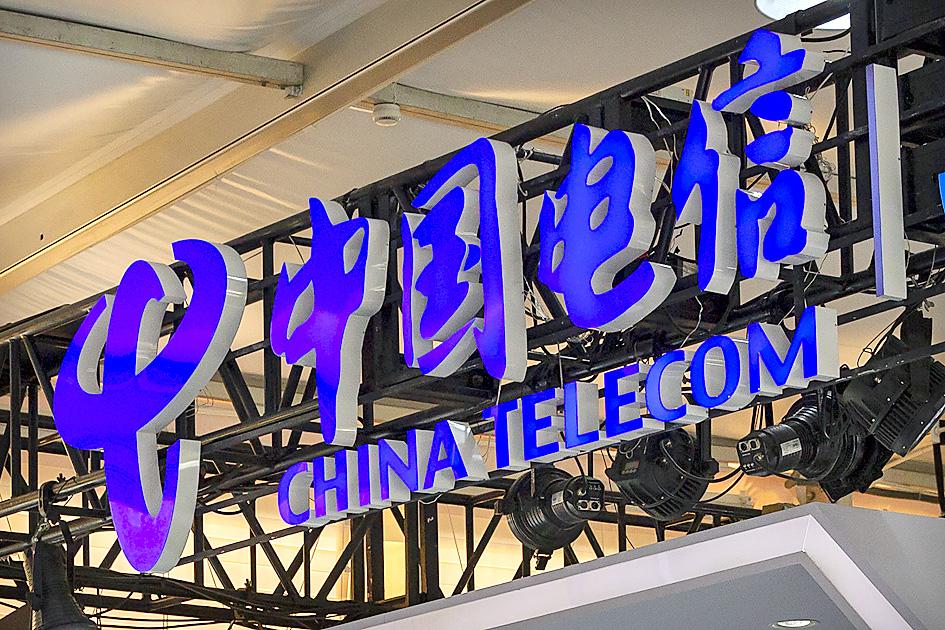The US on Tuesday banned China Telecom Corp (中國電信) from operating in the country, citing “significant” national security concerns.
The US Federal Communications Commission (FCC) ordered China Telecom Americas Corp to discontinue its services within 60 days, ending nearly 20 years of operations in the US.
The firm’s “ownership and control by the Chinese government raise significant national security and law enforcement risks,” the FCC said in a statement.

Photo: AP
It gives opportunities for Beijing “to access, store, disrupt, and/or misroute US communications, which in turn allow them to engage in espionage and other harmful activities against the United States,” it said.
“The FCC’s decision is disappointing,” China Telecom spokesman Ge Yu (葛宇) said in an e-mail, Bloomberg News reported. “We plan to pursue all available options while continuing to serve our customers.”
There was no response to an e-mail sent to the press contact at the Chinese embassy in Washington.
The announcement on Tuesday ramped up concerns about further measures against Chinese tech firms and battered shares in such firms listed in New York.
The selling continued yesterday in Hong Kong, where Chinese tech firms experienced hefty selling, pulling the Hang Seng Index 1.6 percent lower.
The Hang Seng Tech Index lost more than 3 percent, with Tencent Holdings Ltd (騰訊), Alibaba Group Holding Ltd (阿里巴巴), JD.com Inc (京東) and XD Inc (心動) among those taking a hit in morning trade.
The move “seems to dampen previous hopes that the US-China relations may be turning for the better,” IG Asia Pte market strategist Yeap Jun Rong said.
It “has raised some doubts as to whether further escalation may bring back more US scrutiny on Chinese technology players,” he said.
China Telecom, China’s largest fixed-line operator, was delisted by the New York Stock Exchange in January, along with fellow state-owned telecoms firms China Mobile Ltd (中國移動) and China Unicom Hong Kong Ltd (中國聯通).
That followed an executive order by then-US president Donald Trump banning investments by Americans in a range of companies deemed to be supplying or supporting China’s military and security apparatus.
The US Department of Justice in April last year threatened to terminate China Telecom’s US dealings, saying that US government agencies “identified substantial and unacceptable national security and law enforcement risks associated with China Telecom’s operations.”
The move “sends a broader message to Beijing, that regardless of who’s president, the US continues to be concerned about the risks posed by Chinese tech firms operating in the US,” the Washinton-based Center for a New American Security’s director of the technology and national security program, Martijn Rasser, told Bloomberg.

A magnitude 5.6 earthquake struck off the coast of Yilan County at 12:37pm today, with clear shaking felt across much of northern Taiwan. There were no immediate reports of damage. The epicenter of the quake was 16.9km east-southeast of Yilan County Hall offshore at a depth of 66.8km, Central Weather Administration (CWA) data showed. The maximum intensity registered at a 4 in Yilan County’s Nanao Township (南澳) on Taiwan’s seven-tier scale. Other parts of Yilan, as well as certain areas of Hualien County, Taipei, New Taipei City, Taoyuan, Hsinchu County, Taichung and Miaoli County, recorded intensities of 3. Residents of Yilan County and Taipei received

Taiwan has secured another breakthrough in fruit exports, with jujubes, dragon fruit and lychees approved for shipment to the EU, the Ministry of Agriculture said yesterday. The Animal and Plant Health Inspection Agency on Thursday received formal notification of the approval from the EU, the ministry said, adding that the decision was expected to expand Taiwanese fruit producers’ access to high-end European markets. Taiwan exported 126 tonnes of lychees last year, valued at US$1.48 million, with Japan accounting for 102 tonnes. Other export destinations included New Zealand, Hong Kong, the US and Australia, ministry data showed. Jujube exports totaled 103 tonnes, valued at

TRUST: The KMT said it respected the US’ timing and considerations, and hoped it would continue to honor its commitments to helping Taiwan bolster its defenses and deterrence US President Donald Trump is delaying a multibillion-dollar arms sale to Taiwan to ensure his visit to Beijing is successful, a New York Times report said. The weapons sales package has stalled in the US Department of State, the report said, citing US officials it did not identify. The White House has told agencies not to push forward ahead of Trump’s meeting with Chinese President Xi Jinping (習近平), it said. The two last month held a phone call to discuss trade and geopolitical flashpoints ahead of the summit. Xi raised the Taiwan issue and urged the US to handle arms sales to

BIG SPENDERS: Foreign investors bought the most Taiwan equities since 2005, signaling confidence that an AI boom would continue to benefit chipmakers Taiwan Semiconductor Manufacturing Co’s (TSMC, 台積電) market capitalization swelled to US$2 trillion for the first time following a 4.25 percent rally in its American depositary receipts (ADR) overnight, putting the world’s biggest contract chipmaker sixth on the list of the world’s biggest companies by market capitalization, just behind Amazon.com Inc. The site CompaniesMarketcap.com ranked TSMC ahead of Saudi Aramco and Meta Platforms Inc. The Taiwanese company’s ADRs on Tuesday surged to US$385.75 on the New York Stock Exchange, as strong demand for artificial intelligence (AI) applications led to chip supply constraints and boost revenue growth to record-breaking levels. Each TSMC ADR represents